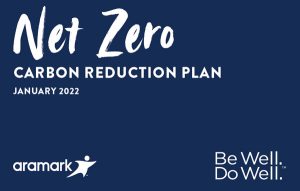 Aramark Northern Europe has become the first region within Aramark’s global operations to announce its commitment to become net zero carbon organisation by 2050.
Aramark Northern Europe has become the first region within Aramark’s global operations to announce its commitment to become net zero carbon organisation by 2050.
The carbon reduction target, based on a 2019 assessment baseline, encompasses all of Aramark Northern Europe’s Scope 1 and Scope 2 foodservice, workplace solutions, facilities management, as well as property and estate management services in the UK and Ireland, as well as a rigorous set of Scope 3 emissions categories.
As part of the Aramark Northern Europe operational business, both the baseline and commitment include Aramark Global Offshore oil and gas operations, headquartered in Aberdeen.
Aramark Northern Europe has also committed to align with the global business’ commitment to set science-based targets following the Science Based Target Initiative’s new Net-Zero Standard over the next 24 months.
To deliver this ambitious global target, the regional organisation is committing to transform the carbon-intensive areas of operations, as well as working with suppliers to change contributing factors within the Scope 3 Supply Chain.
Frank Gleeson, CEO of Aramark Northern Europe commented: “I’m proud to launch the Aramark Northern Europe commitment to Net Zero by 2050. We are taking a collaborative approach to solving this global challenge, we are working to tackle climate change so that we can make a difference across all the sites and communities in which we operate. Aramark Northern Europe, including our UK, Ireland and Global offshore business, has worked diligently, to understand, interrogate, and improve upon the impact of our operations; all the while ensuring that we also improve our services for clients and customers alike.
“The urgency of the climate crisis has renewed our focus on innovation, collaboration, and competition on a scale that we have never seen before. There is no sustainability practice or effort too small, nor too insignificant, once it is firmly rooted in the intent to do right. With that in mind, everyone in our organisation is committed to playing their part in ensuring we meet our Net Zero Roadmap and Commitments for the region.”
Aramark Northern Europe says its Net Zero commitments are built around areas where it can have the most impact:
- Transport: Replacing the existing fleet of diesel and petrol owned and leased vehicles to electric vehicles (EV) as soon as is practical. Drivers will be provided training on how to drive more efficiently to reduce emissions, which will be monitored and captured by telematics.
- Energy Efficiency: All electricity contracts will be procured from renewable or low carbon sources. Green champions at each site will gather up monthly energy performance data to provide feedback that will be are incorporated into capex decisions. Our Business Excellence, Facilities and Property Management Teams will also collaborate and integrate service lines, where appropriate, to provide multi-faceted reduction solutions across our workplace footprint.
- Goods and services: In Northern Europe, Aramark has already been moving towards a higher percentage of plant-based meals along with the development of a science-based climate friendly menu proposition. With this, we are changing recipes, increasing the mix of delicious, plant-based, and environmentally sustainable dishes, that are based on 50 key ingredients.
- Source locally: Aramark prides itself on a long-standing commitment to identify, partner with, and support local producers. The organisation takes care to operate with a detailed understanding of our product, transport logistics, and food waste categories as we manage our impact on the planet. As the organisation continues to deliver on this ambition, a preference for locally sourced will be given in instances where carbon reduction can be achieved.
- Minimising waste and maximise recycling: Aramark will trial software that tracks and manages food wastage, indicating possible changes to menus and portion sizes. In addition, staff training programmes will minimise waste and maximise recycling with food waste sent to anaerobic digestion plants.
- Travel: Aramark will encourage our staff to embrace technology to limit travel. Where travel is required, it will prioritise carbon reducing travel modes, such as rail over air and cars.
- Engage Employees: Aramark will encourage employees to join its sustainable journey by putting in place and extending initiatives such as cycle to work schemes, encouraging carpool arrangements, providing information on public transport alternatives, installing EV charge points and paying favourable mileage reclaim rates to EV vehicles.
This Net Zero milestone is also combined with wider ESG efforts for Northern Europe, ranging from mandatory Sustainability e-learning for all 15,000 employees in the region, along with operational training and tools on plastic packaging, waste management, energy saving, and food waste prevention.
FMJ & Advetec are on a mission to help FMs accelerate their NetZero plans – but it’s a process that must first start with lifting the blindfold, challenging the waste supply chain, being accountable and making great user of technology.
On the 26th January at 11am FMJ & Advetec are holding a webinar on how biotechnology can help FMs achieve their sustainability goals and reduce food waste.
FMJ Editor, Sara Bean, will be joined by:
- Dr Stephen Wise, Chief Strategic Development Officer, Advetec
- Rochelle Gee, Head of Property Services, Buckinghamshire Healthcare NHS Trust
- Ray Parmenter, CChem MRSC, MCIWM, CIWM: Head of Policy and Technical
- Chris Havers, Programme Director Acclaro Advisory & SFMI
Together they will discuss:
- The role of the circular economy in helping cut carbon emissions.
- Challenges and opportunities for FMs in managing waste to meet environment, social and governance (ESG).
- How the latest technology is available to help.
Click here to register.




